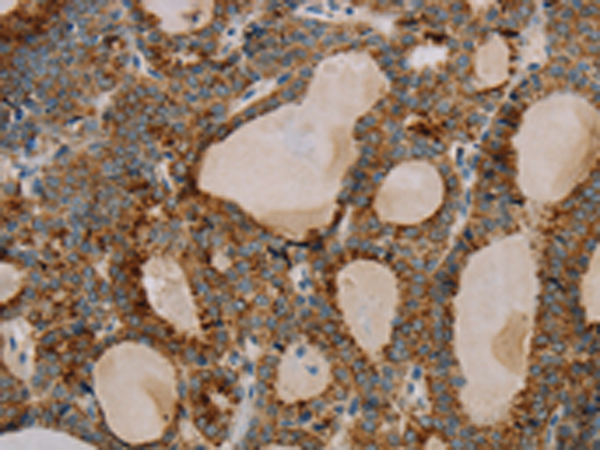

| WB | 咨询技术 | Human,Mouse,Rat |
| IF | 咨询技术 | Human,Mouse,Rat |
| IHC | 1/25-1/100 | Human,Mouse,Rat |
| ICC | 技术咨询 | Human,Mouse,Rat |
| FCM | 咨询技术 | Human,Mouse,Rat |
| Elisa | 1/1000-1/2000 | Human,Mouse,Rat |
| Aliases | PSARL; PSARL1; RHBDS1; PRO2207; PSENIP2 |
| Host/Isotype | Rabbit IgG |
| Antibody Type | Primary antibody |
| Storage | Store at 4°C short term. Aliquot and store at -20°C long term. Avoid freeze/thaw cycles. |
| Species Reactivity | Human, Mouse, Rat |
| Immunogen | Fusion protein of human PARL |
| Formulation | Purified antibody in PBS with 0.05% sodium azide and 50% glycerol. |
+ +
以下是3篇关于PARL(Presenilin-associated rhomboid-like protein)抗体的参考文献及其摘要概括:
---
1. **文献名称**: *Mitochondrial rhomboid PARL regulates cytochrome c release during apoptosis via OPA1-dependent cristae remodeling*
**作者**: Cipolat, S., et al.
**摘要**: 该研究通过PARL特异性抗体验证了PARL在线粒体内膜中的功能,发现PARL通过切割OPA1蛋白调控线粒体嵴结构重塑,进而影响细胞凋亡过程中细胞色素c的释放。实验表明PARL缺陷导致线粒体形态异常并抑制凋亡信号传导。
---
2. **文献名称**: *PARL deficiency in mouse causes Complex III defects, coenzyme Q depletion, and Leigh-like syndrome*
**作者**: Sikorski, E.M., et al.
**摘要**: 研究利用PARL抗体在小鼠模型中发现,PARL缺失导致线粒体复合体III功能异常及辅酶Q缺乏,引发类似Leigh综合征的神经退行性病变。PARL抗体在Western blot和免疫组化中用于检测组织特异性表达及蛋白定位。
---
3. **文献名称**: *Rhomboid protease PARL mediates the mitochondrial membrane potential loss-induced cleavage of PGAM5*
**作者**: Sekine, S., et al.
**摘要**: 该文献通过PARL抗体和基因敲除模型,揭示了PARL在响应线粒体膜电位下降时切割PGAM5蛋白的作用,进而激活下游坏死性凋亡通路。研究强调了PARL在细胞死亡调控中的关键地位。
---
4. **文献名称**: *PARL: A mitochondrial rhomboid protease with multiple layers of function*
**作者**: Spinazzi, M., et al.
**摘要**: 综述性文章总结了PARL的结构、功能及抗体应用,涵盖其在线粒体质量控制、代谢调节及神经退行性疾病中的作用,特别讨论了PARL抗体在解析其底物识别机制中的应用案例。
---
以上文献可通过PubMed或Web of Science平台检索原文,研究内容覆盖PARL的分子机制、疾病关联及实验工具开发。
PARL (Presenilin-associated rhomboid-like) antibody is a tool used to detect the PARL protein, a mitochondrial intramembrane serine protease belonging to the rhomboid family. PARL is primarily located in the inner mitochondrial membrane and plays critical roles in mitochondrial quality control, dynamics, and apoptosis. It processes substrates such as PGAM5 (a phosphatase involved in necroptosis) and regulates mitofusin degradation, impacting mitochondrial fusion-fission balance. PARL also participates in the cleavage of PINK1. a kinase linked to Parkinson’s disease, influencing PINK1/Parkin-mediated mitophagy. Dysregulation of PARL has been implicated in neurodegenerative disorders, metabolic syndromes, and cancer.
PARL antibodies are essential for studying these processes, enabling researchers to analyze PARL expression, localization, and interactions via techniques like Western blotting, immunoprecipitation, and immunofluorescence. Specific antibodies (e.g., monoclonal or polyclonal) are validated for species reactivity (human, mouse, rat) and application-specific performance. Recent studies highlight PARL's role in mitochondrial stress responses, making its antibody a valuable reagent for exploring disease mechanisms and therapeutic targets. Quality validation (e.g., knockout controls) ensures antibody specificity, crucial for accurate experimental outcomes in mitochondrial biology research.
×